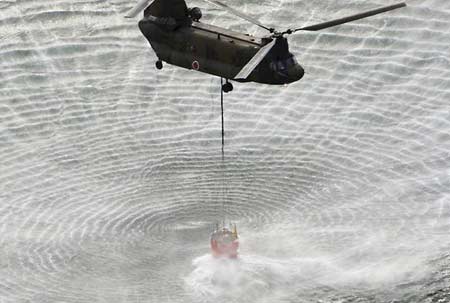|
 A military helicopter scoops water off the Japanese coast to dump on the stricken Fukushima Daiichi nuclear power plant. |
|
Fukushima is not Chernobyl, scientists repeat, and even Chernobyl was not as deadly as popularly believed. Dire warnings of radiation spreading from Japan's embattled Fukushima Daiichi nuclear power plant to deadly effect across Japan, or even to California, are likely overblown, they say. Radiation is all around us, varying with the number of miles we fly, the elevation of our towns, and the minerals in our environments, scientists point out. We live with it, and most of the time it is harmless. “There is an increased level of anxiety disproportionate to the actual risk,” says Jerrold Bushberg, who directs programs in health physics at the University of California at Davis. “It’s the dose that makes the poison. It’s not a binary thing.” Fear and hype surround radiation, which has become something of a bogeyman in part because of popular culture. A radioactive spider bit Peter Parker and turned him into Spiderman. Bruce Banner absorbed radiation in a bomb explosion and became The Incredible Hulk. Radiation from nuclear detonations morphed a small lizard into Godzilla. “It gives you subliminal messages about the capacity of radiation to do harm,” Professor Bushberg says in a telephone interview. A buy-up of potassium iodide tablets, which some say guard against some effects of radiation exposure, is “premature” in America, he says, and concerns over contaminated Japanese exports are also alarmist. “That’s crazy, absolutely crazy,” agrees Shan Nair, a former nuclear physicist who was one of two UK experts assisting the European Commission in the post-accident Chernobyl response. “It’s important to have a sense of proportion here.” And even then, Chernobyl was a very different incident from what is now unfolding at Fukushima Daiichi. Chernobyl’s reactor lacked a containment facility, unlike the Fukushima plant, whose GE-made containment vessels have withstood both an earthquake, tsunami, and thus far, a partial meltdown. When it comes to nuclear power, says Bushberg of the University of California, "there is a lot of misinformation." (Read by Lee Hannon. Lee Hannon is a journalist at the China Daily Website.) (Agencies) |
科学家反复强调,福岛不是切尔诺贝利,而且切尔诺贝利也不像公众所想的那么可怕和危险。 日前传出可怕的警告,称日本福岛第一核电站危机四伏,它的核辐射扩散将对全日本、甚至美国加州造成致命后果。科学家称,这种警告很可能是言过其实。 科学家指出,我们四周到处是辐射,辐射多少和我们飞行的里数、我们居住的城镇的海拔以及周围环境的矿物质有关。我们生活在辐射当中,而且大多数时间我们所受到的辐射是无害的。 加州大学戴维斯分校保健物理学专业项目的负责人杰罗德•布希伯格说:“人们的焦虑情绪日益强烈,但实际上人们并不需要如此担忧。只有剂量够大,才会把人毒死。并不是非此即彼。” 有关核辐射的恐惧和炒作由于在某种程度上受大众文化影响,变得像鬼怪一样。彼得•帕克被一只遭到辐射的蜘蛛咬过之后,就成了蜘蛛人。布鲁斯•班纳在吸收了炸弹爆炸中的辐射后,就变成了神奇绿巨人。核爆炸产生的辐射还使一只小蜥蜴变异成了怪兽哥斯拉。 布希伯格教授在一次电话访谈中说:“这传达了一种信息,让你在潜意识里认为辐射能带来的危害是无限的。” 有人认为碘化钾药片可以起到一定的防辐射作用,于是人们大量买进这种药片。布希伯格认为这一举动在美国还“为时过早”。他说,有关日本出口货物受到污染的说法也是危言耸听。 前核物理学家杉•奈尔也同意这一观点,他说:“这真的很疯狂,太疯狂了。人们应该适可而止。”奈尔曾经是协助切尔诺贝利事故后续反应欧洲委员会工作的两个美国专家之一。 尽管都是核事故,切尔诺贝利事故和现在福岛第一核电站发生的事故也是有很大不同的。切尔诺贝利核电站的反应堆缺少防范设施,而福岛核电站有美国通用制造的防范设施,而且福岛核反应堆已经经历了一场地震和一场海啸,迄今为止,也只是部分核心熔毁而已。 加州大学的布希伯格说,关于原子能“有太多的错误信息”。 相关阅读 (中国日报网英语点津 陈丹妮 编辑:冯明惠) |
|
Vocabulary: embattled: surrounded by problems and difficulties(被困扰的;处境艰难的;危机四伏的) overblown: that is made to seem larger, more impressive or more important than it really is exaggerated(过分的;夸张的) binary: consisting of two parts(二元的;由两部份组成的) hype: exaggeration about something in order to get a lot of public attention(炒作) bogeyman: an imaginary evil spirit that is used to frighten children (用以吓唬小孩的)鬼怪 radioactive: emitting or relating to the emission of ionizing radiation or particles(放射性的;和辐射相关的) hulk: a very large object, especially one that causes you to feel nervous or afraid (尤指令人紧张或害怕的)庞然大物 detonation: an explosion; the action of making something explode(爆炸;起爆;引爆) morph: change or cause to change smoothly from one image to another by small gradual steps(演变,变体) subliminal: affecting your mind even though you are not aware of it(下意识的;潜意识的) buy-up: 全部(或尽量)买下某物;收购 potassium iodide tablet: 碘化钾药片 alarmist: causing unnecessary fear and anxiety(危言耸听的;骇人的) meltdown: a serious accident in which the central part of a nuclear reactor melts, causing harmful radiation to escape 核反应堆核心熔毁(导致核辐射泄漏) |
